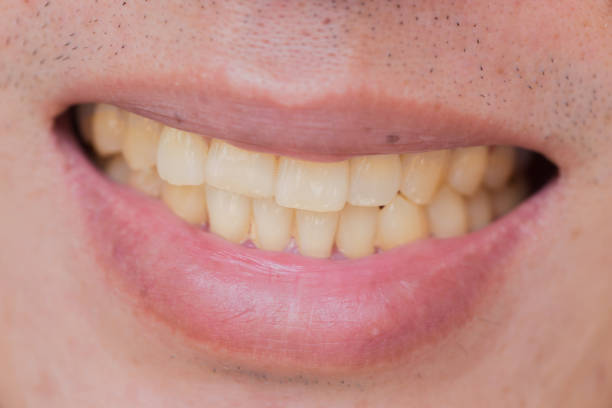Stained teeth and how they can be a big problem for some people.
Stained teeth can be a significant cosmetic concern for many individuals. They can be caused by a variety of factors such as consuming certain foods and beverages, smoking, and poor oral hygiene. The discoloration can range from yellowing to brown or even black spots, and can greatly affect a person's confidence and self-esteem. There are a variety of treatments available for stained teeth, including professional teeth whitening and at-home whitening kits.
Different causes of stained teeth and how to avoid them.
Stained teeth can be caused by a variety of factors, including:
Consuming certain foods and beverages such as coffee, tea, red wine, and dark-colored sodas.
Smoking or using other forms of tobacco
Poor oral hygiene, which can allow plaque and tartar to build up on the teeth
Certain medications, such as tetracycline antibiotics, can cause discoloration in developing teeth
Ageing: as we age, the outer layer of the tooth, called enamel, wears away revealing the darker dentin layer
Trauma to the teeth can cause discoloration
To avoid stained teeth, it is recommended to:
Brush and floss teeth regularly to remove plaque and bacteria
Use an antiseptic mouthwash to kill bacteria
Limit consumption of stain-causing foods and beverages
Quit smoking or using tobacco products
Use a straw when consuming drinks to reduce contact with the teeth
Regularly visit your dentist for cleaning and checkups
Use toothpaste specifically formulated for whitening
By following these tips, you can help prevent tooth discoloration and maintain a bright, healthy smile.
Different ways to treat stained teeth and what the best options are for each individual.
There are several options for treating stained teeth, including:
Professional teeth whitening: This is considered one of the most effective ways to whiten teeth. Your dentist can apply a bleaching agent to the teeth and activate it with a special light or laser. This process can be done in the dental office or at home with custom-made trays provided by your dentist.
At-home teeth whitening kits: These kits contain a lower concentration of bleaching agents and can be used at home. They include trays or strips that are worn for a certain amount of time each day.
Surface stains: If the discoloration is only on the surface of the tooth, a professional cleaning or polishing can remove the stain.
Veneers: A dental veneer is a thin shell that is placed over the front of the tooth. They can be used to cover stains, chips or gaps in the teeth.
Crowns: In case of severe discoloration or damage, a crown can be used to cover the tooth.
The best option for an individual will depend on the specific cause and severity of the discoloration, as well as their personal preferences and budget. It's always best to consult with a dentist for a proper diagnosis and treatment plan.
Microabrasion: is a procedure that uses a fine abrasive powder and water to remove the superficial discoloration from the enamel of the tooth.
Bonding: is a procedure where a tooth-colored material is applied to the tooth and hardened with a special light.
Teeth Cleaning: The most simple and cost-effective way to remove stains is to have regular teeth cleaning done by a dental hygienist. This will remove the surface stains caused by food, drinks, and smoking.
Tips on how to keep stained teeth from reoccurring.
Here are some tips to help prevent stained teeth from reoccurring:
Practice good oral hygiene: Brush and floss your teeth at least twice a day to remove plaque and bacteria. Use an antiseptic mouthwash to kill bacteria and freshen breath.
Limit consumption of stain-causing foods and beverages: Reduce or eliminate your intake of foods and drinks that can cause staining, such as coffee, tea, red wine, and dark-colored sodas.
Quit smoking or using tobacco products: Smoking and using tobacco products can cause significant staining and discoloration of the teeth.
Use a straw: When consuming drinks that can cause staining, use a straw to reduce contact with the teeth.
Regularly visit your dentist for cleaning and checkups: Regular dental visits can help remove surface stains and detect any potential issues early on.
Use toothpaste specifically formulated for whitening: Some toothpastes contain mild abrasives or enzymes that can help remove surface stains.
Avoid excessive bleaching: Overuse of teeth whitening products can cause tooth sensitivity and damage to the enamel.
Wear a night guard if you grind your teeth: Night grinding can cause tooth wear and discoloration. Wearing a night guard can protect your teeth and prevent discoloration.
By following these tips, you can help prevent tooth discoloration and maintain a bright, healthy smile. Remember that even with the best preventive measures, teeth may still become discolored over time, especially as we age. Regular professional cleaning and check-ups with your dentist will help keep your teeth looking their best.


Post a Comment